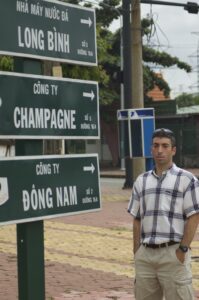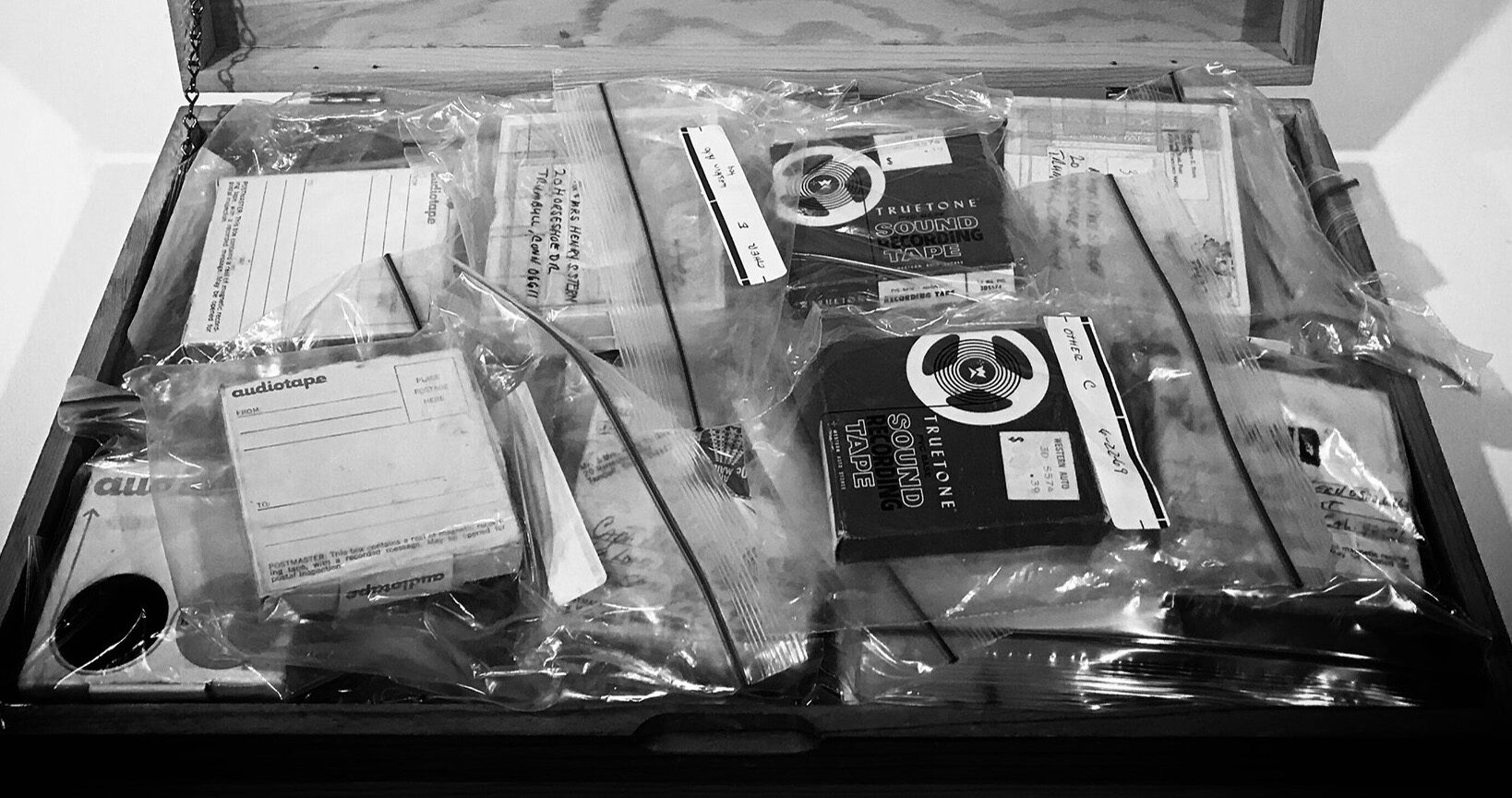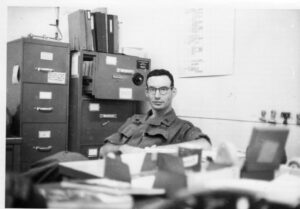So many questions
Filmmaker Greg Stern, BA ’00, never spoke to his father, Bruce Stern, about his tour of duty in Vietnam. It wasn’t something you discussed in their family.
“It was just one of those things where I didn’t ask him — or figured I’d have more time to ask him,” says Stern, an Emmy award-winning documentarian.
But in 2007, time ran out. The 64-year-old Army veteran died suddenly of a heart attack. His grieving son had no option but to file away those unanswered questions forever.
Opportunity knocks
In 2008, Stern got a rare and wonderful chance to hear from his father again.
He and his mother, Judi, were cleaning out his father’s things when Stern opened a nondescript box. It contained reel-to-reel tapes of the elder Stern’s audio recordings — voice letters — from Vietnam. There were boxes of slides and thousands of photos from his deployment, including shots with entertainer Joey Bishop of the Rat Pack and actress Tippi Hedren, star of Alfred Hitchcock’s The Birds. A garbage bag held every single letter his father received while in Vietnam. Each was nicely folded in its original envelope with the postage still attached.
“This was my second chance to ask him about it in a different kind of way,” Stern says. “This archival material was filmmaker’s gold and I just had to do something with it. I couldn’t just let it sit there and do nothing. I wanted to tell his story.”
The result is the award-winning, independent documentary Letters from Long Binh.
War and peace
Stern’s directing/producing career dates as far back as his sophomore year at U-M, when he served as sports director for WOLV-TV. During nearly a decade at HBO post-graduation, he contributed to documentaries about the 1980 U.S. Olympic hockey team and the U-M/Ohio State rivalry. Today Stern is an award-winning director of multiple shows and specials at the MLB Network and the NHL Network.
Working with his father’s personal archive was unlike anything he’d done for the networks.
“It was my dad’s voice and there were other voices — my grandparents, my great-grandparents, family friends,” Stern says. “It was a mass of voices from — at that point — 40 years ago.”
The elder Stern, who was a captain in the U.S. Army, enlisted and went to Vietnam at 26. He was an alumnus of the Wharton School of the University of Pennsylvania and the New York University School of Law.
“He thought he’d be drafted,” Stern says. “He was already older and had ROTC and Officers’ Training School in his back pocket and a law degree, so maybe he figured that if he enlisted, he’d get a better job. I know I’m biased, but he was the smartest person I’ve ever known and I can say that, even though he was my father. He was patriotic, too.
“At that point … Vietnam, in the beginning, wasn’t what it turned out to be at the end,” he continues. “It was still a patriotic thing. He thought he was doing a service for his country and that maybe he’d be able to help out.”
In Vietnam, Bruce Stern was stationed at Long Binh Post from 1968-69 and worked as a post-fund custodian. He managed and allocated funds to soldiers who needed various items on the base. He didn’t see combat on the front lines, but he went on border patrols several times a week, checking the perimeter outside the base, early in the morning or late at night.
“[The job] frustrated him,” says Stern. “He had education and expertise in certain areas and he didn’t get to do that. You can hear it in his voice throughout the film. He was not being used most effectively.”
Moving pictures
Greg Stern, a self-described “organization freak” spent more than a decade directing Letters from Long Binh.
“I took every letter and put them all in order. They’re now in binders. All the tapes were transcribed word for word with time codes, so I could easily access everything,” he says.
Initially, Stern intended to interview other Vietnam veterans or their loved ones. But when it became clear the plan was too ambitious, he dialed back the concept to focus solely on his father. He traveled to Vietnam and located several of the elder Stern’s Army buddies and his girlfriend at the time, all of whom he interviewed for the movie.
“Then, life happened,” says Stern. “I got married and had a couple of kids. I was able to work on it only for five minutes here, five minutes there; an hour here, an hour there.”
Stern’s wife, Kristen, is a producer on Letters from Long Binh. They live with their two sons in Mamaroneck, N.Y.
And while Stern wanted to create a keepsake for his family, he also hoped to deliver a film that would resonate with general audiences.
“I wanted it to be a great home video and also something people could relate to on the outside,” he says. “This August marked the 50th year my dad came back from Vietnam. I gave myself a deadline of this year to mark his return.”
Stern says his most vexing challenge was deciding what to include in the film and what to omit. Ultimately, he focused on being truthful, funny, and showing how his father’s mood changed during his tour of duty.
“In the end, I wanted it to be concise without missing a thing,” Stern says.
Prizewinner

As part of his process, Greg Stern visited his father’s outpost in Vietnam in 2009. (Image courtesy of Greg Stern.)
To date, Letters from Long Binh has won several awards. It was named Best Documentary Short at Detroit’s Trinity International Film Festival. This honor follows awards at the 2019 Spotlight Documentary Film Awards where it was a Bronze Medal Winner and the Hollywood New Directors Film Festival where it received an Honorable Mention. The movie has been accepted into the Yonkers Film Festival, the Fatherhood Image Film Festival, and the Mesa International Film Festival.
But Stern’s real prize has been reconnecting to his father.
“Words can’t express how gratifying it is for me to keep my dad’s memory alive by sharing his experience from such a turbulent time in our nation’s history,” he says.
In many ways, these audio recordings and letters have made Stern feel closer to his dad, a proud Wolverine parent who had plenty of maize-and-blue memorabilia.
“It’s almost like I’m able to keep him with me,” Stern says. “My wife and kids never had the chance to meet my dad, so once my kids are old enough, I’ll show it to them. It’ll bring him to life for them too, eventually.”
(Top image: Bruce Stern’s box of tapes, letters, and photos from his tour in Long Binh inspired his son’s documentary. The image is courtesy of Greg Stern.)





Hernando Ramos. M. D. PhD - 1968
I also served in Vietnam at the 24th Evac Hospital in Long Binh as chief of the Maxillofacial team, from 1969 to 1970. That year, traumatic as it was, changed my life for the better.
Reply
Dan Markham - 1970
You might enjoy “Long Daze at Long Binh,” a humorous memoir about the 24th Evac Hospital written by two Army medics. See reviews, photos and sample chapters at longbinhdaze.com
Reply
Dave Law - 1967
Graduated from LSA in December ’67 and inducted into the Army in January ’68 – thinking I would end up in the Medical Service Corps. That didn’t happen and I ended up being a combat Infantry Company Commander at the age of 24. We saw plenty of action in Tay Ninh Province and were also involved with the 1970 Cambodian invasion. In spite of profound regret for having taken human life (no civilian casualties), I remain grateful for the lessons I learned in a combat zone. Also proud that we suffered no friendly KIA under my tenure. Regrettably many of the profound lessons from Vietnam have been ignored by our leaders. Grateful for GI Bill benefits – helped pay for grad school, refinance our home, and more recently, I’ve begun receiving excellent healthcare at the Ann Arbor VA Hospital.
Reply
Craig Ham - M.A., 1976
As a young Captain (MP) I had already been a company commander in Germany when I was sent for Vietnamese Language training at Fort Bliss. I arrived at Long Binh in March of 1972 – assigned as a staff officer at HQ, U.S. Army Vietnam. It was once the largest military installation outside of the U.S. – and we left it in November of that year, handing over the base to our RVN allies. I finished my year and two days in Vietnam on an inspection team operating out of Saigon. In 1974 the Army sent me to UofM to get a Masters in Geography. I retired as a Colonel after 26 years of service – half of it teaching at West Point. My two years in Ann Arbor were made enjoyable by a long list of friends, mentors and fellow graduate students. My mother saved every card and letter from Long Binh – I only regret that there were not more of them.
Reply
clifford Cool - M.A. 1973
I got drafted after I got my B.A. at Albion College in 1979. I served at Long Binh from Nov. 1970 until Nov. 1971. One of the many memories was seeing Bob Hope and Joey Heatherton. Clint Jones, running back from M.S.U. also came through on a USO tour and I chatted with him. After the war I had a history seminar with an army Captain who was working on an M.A. in diplomatic history. The seminar had some lively discussions about My Lai.
Reply